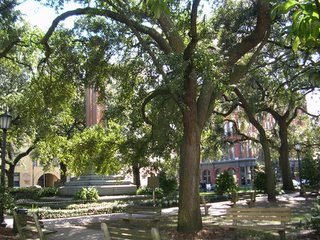Charles Town

After Savannah, we went to Charleston, SC, where my mom used to live, and where our ancestors supposedly (with a big emphasis on "supposedly") came to the city the year John Locke wrote the Charles Town charter for the eponymous Charles II, who was of course namesake of the King Charles Spaniel.
To be honest, I'm not 100% sure if we're decended from the Founders of Charleston or not. My relatives, like all good Southerners, are inclined to "exaggerate," which is kind of like lying, only ... okay, it's exactly like lying. But the theory is that if enough people believe something, it is somehow converted into truth. They belive that fiction - even more than the truth - is a deeply sacred thing. Every Southern family has a James Frey-type memory, the kind that probably wouldn't stand up to a team of editorial fact checkers. But fortunately, nobody ever bothers. They know, like all good storytellers, that fiction usually makes for a much better narrative than literal history, which is mostly full of Stamp Acts and heated disagreements over bond issue referendum (whatever that means).
Kind of like how Faulkner said that his characters were more real to him than his own daughter. Which is a pretty harsh message to send to his daughter. "Yes, dear, you're much less real to me than an imaginary retarded kid who's in love with a cow." If I remember correctly, she committed suicide at a young age. But I digress. Which is another unfortunate side-effect of Southern-ness, which is also sometimes referred to as "ADD".
My grandmother and her sister always insisted that we were descended from raow-uhlty (or, royalty, to those who don't call it the "War of Northern Aggression"), but I'm not sure of any empirical evidence that backs that up. All proper Southern ladies are convinced they are decended from royalty. I've never understood that. If they were so royal back in Scotland or France or wherever they came from, I can't imagine they would have been very anxious to give up their castles and servant wenches and velvet clothing for the glories of rice farming in a dangerous, mosquito-filled country loosely founded upon anti-royal sentiments. No. If you were royal - unless you were crazy (not ruling that out) - you would probably want to stay in a designated royal place, and oppress people, or collect Welsh Korgis, or carry on affairs with horsey-looking women, or whatever it is that royals do.
But anyway. Here are some pictures of Charleston. Let's just assume my ancestors lived in these main-shuns (that is: mansions; they weren't speaking Chinese, I'm just not good at writing dialects), sitting on a wide porch drinking mint juleps with Elvis and General Lee (that is, Robert E., not the flying car from The Dukes of Hazard), playing chess with their well-compensated servants of African descent who were really very glad to be there, and not oppressed in any way. After all, if you don't know the truth, anything could be true.




